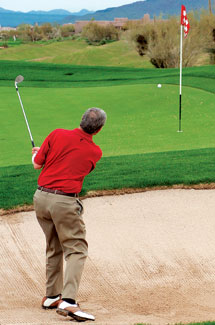Pounds in horse racing
Question
I am reading a book about Seabiscuit and I am really enjoying the book. I know very little about horse racing. My question is: what do pounds have to do with the race? Mr. Howard always wants Seabiscuit rated 130 or under, I am confused.
Thank You
Mary
Answer
Mary -
Thanks for your question. It was my pleasure to have a very small role in helping to do the research for "Seabiscuit" (look in the small print of the Acknowledgements section and you'll find my name). I'm glad you're enjoying the book - I think it's one of the best racing books I've ever read.
As for pounds, what they're talking about is the amount of weight the horses are required to carry during a race. In many races (especially "handicap" races such as the Santa Anita Handicap that Seabiscuit won), horses with good records are required to carry more weight than horses with poorer records, in order to give the lesser horses a better chance to win. The idea isn't to unfairly penalize the better horses (although that's certainly the effect); the goal is to increase wagering by making the poorer horses seem to have a chance.
Mr. Howard wanted Seabiscut to race under 130 pounds because the less weight Seabiscuit was required to carry, the better chance he had to win. There's an old adage in racing that "enough weight will stop a freight train," and trainers are forever trying to persuade racing secretaries (who assign the weights) that their runners shouldn't be asked to carry heavy weights. While this is strictly a generalization, the general thought in handicapping is that each additional pound a horse is required to carry costs the horse one length.
One famous weight-carrying thoroughbred of many years back was the great Exterminator, which won 50 of his 100 races despite carrying weights of as much as 140 pounds. Discovery was another horse well-known for lugging high weights.
In more modern times, Dr. Fager once carried 139 pounds in the 7-furlong 1968 Vosburgh Stakes, and missed equaling the world record by just 1/5 of a second while winning by 6 lengths. Five-time Horse of the Year Kelso often won under 130 pounds or more. However, runners today are rarely asked to shoulder as much as 130 pounds, which is just as well because carrying high weights can cause runners to break down.
I hope this helps to explain the concept of how weight affects thoroughbreds in races.
- Mark Shrager
equine question
Dear Ed.Iwould like to know...


